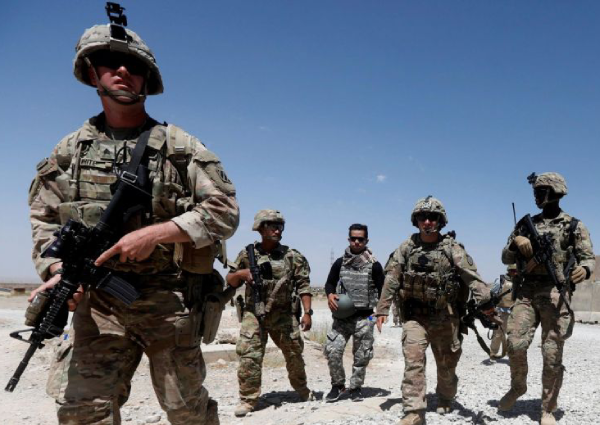US considers significant Afghanistan troop withdrawal

WASHINGTON - President Donald Trump is considering significantly drawing down troops from Afghanistan, two United States officials told Reuters on Thursday (Dec 20), in the latest sign that his patience is thinning both with America's longest war and overseas military interventions generally.
Shortly after the officials spoke, Defence Secretary James Mattis said he was quitting so that Mr Trump could have a Pentagon chief more aligned with the President's views.
Mr Mattis has argued for maintaining a strong US military presence in Afghanistan to bolster diplomatic peace efforts. He also opposed the US troop withdrawal from Syria that Mr Trump announced on Wednesday, a move that has bewildered allies and triggered harsh reaction from Republican allies in Congress.
The Pentagon declined to comment on Afghanistan.
Mr Garrett Marquis, a spokesman for the National Security Council, said the White House would not comment "on future strategic developments".
The US officials, who spoke on condition of anonymity, said thousands of the 14,000 troops could be sent home as a result of the deliberations, the disclosure of which could undermine peace efforts with the Taleban.
Mr Trump privately has been grousing about US military involvement in Afghanistan, telling an ally as recently as Wednesday, words to the effect of: "What are we doing there. We've been there all these years."
The source, who asked to remain unidentified, said it appeared the President "has lost all patience" with the US military presence in Afghanistan.
More than 2,400 US forces have died in the 17-year-old war in Afghanistan, and Pentagon officials have repeatedly warned that a precipitous exit would allow militants to develop new plots on America like the Sept 11, 2001 attacks that plunged the US into an era of open-ended warfare.
It is unclear how the United States with less than 9,000 forces in Afghanistan will be able to fulfil the full set of missions now underway, including training Afghan forces, advising them in the field, and waging an air campaign against the Taleban and other militant groups.
Instead, the United States almost certainly would have to curtail its missions, something that could provide an opportunity for a resurgent Taleban to expand their offensives across Afghanistan.
Mr Mattis had argued for maintaining a strong US military presence in Afghanistan to bolster diplomatic peace efforts. He resigned shortly after US officials raised the possibility that Mr Trump would order the drawdown.
Republican Senator Lindsey Graham, often a vocal Trump ally, warned of possible danger to the US if the drawdown goes through.
"The conditions in Afghanistan - at the present moment - make American troop withdrawals a high risk strategy. If we continue on our present course, we are setting in motion the loss of all our gains and paving the way toward a second 9/11," Mr Graham said in a statement.
Mr Trump last year approved an increase in US troops but acknowledged that he did so reluctantly. US officials have told Reuters that Mr Trump has been keen to bring the Afghan conflict to a close.
The Taleban insurgency has strengthened its grip over the past three years, with the government in Kabul controlling just 56 per cent of Afghanistan, down from 72 per cent in 2015, a US government report showed.
Late last month, at least 22 Afghan police were killed in a Taleban ambush in Afghanistan's western province of Farah, adding to the growing casualty toll on Afghan security forces.
Earlier this week, US special envoy Zalmay Khalilzad and Taleban representatives held talks in Abu Dhabi on a deal that would end the war. Officials from Saudi Arabia and the United Arab Emirates also took part.
The Saudi ambassador to Washington, Mr Khalid bin Salman, tweeted on Thursday that the discussions had been productive and would bring "very positive results by the beginning of next year".
But a former senior State Department official familiar with the issue said that the Taleban representatives rejected a proposal by Mr Khalilzad for a ceasefire and demanded that the talks focus on a US withdrawal. The news that a drawdown was under consideration could be intended as a gesture to the insurgents, the official said.